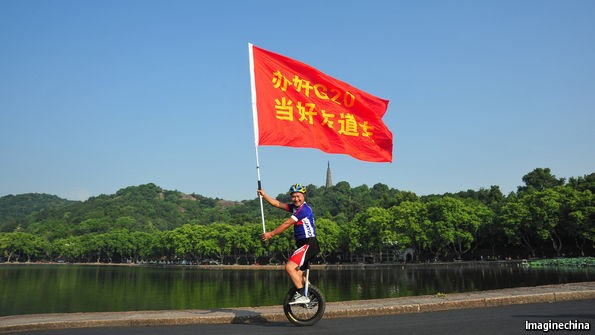Media Report

- The Economist comments: "IF A Martian were to land on earth and be asked, based on effort put into spiffing itself up, which city was the Olympic host this year, there is a good chance it would guess Hangzhou. Rio de Janeiro struggled mightily with its preparations for the summer games, with mixed results. Hangzhou, by contrast, has left no stone unturned, no wall unpainted and no sewer unsealed in getting ready for the G20 Summit, an annual gathering of the leaders of the world's 20 leading economies. Most hosts treat the G20 as a worthy, if rather dull, conference. But China has approached it with gusto, as is its wont with international events that let it showcase its modernity to the world....Even if left in its original state, Hangzhou would surely have impressed visiting dignitaries and journalists....But the G20 summit, to be held on September 4th and 5th, will be the first in China in the eight-year history of such meetings and a hugely important diplomatic occasion for President Xi Jinping. He clearly hopes that the event will highlight how central China has become to solving the world's problems."
- The Washington Post comments: "After three decades of dramatic growth, China's manufacturing engine has largely stalled. With rising salaries, labor unrest, environmental devastation and intellectual property theft, China is no longer an attractive place for Western companies to move their manufacturing....China is well aware that it has lost its advantage, and its leaders want to use the same technologies that have leveled the playing field to give the country a new strategic edge....China has made this a national priority and is making massive investments. Just one province, Guangdong, committed to spending $150 billion to equip its factories with industrial robots and create two centers dedicated to advanced automation. But no matter how much money it spends, China simply can't win with next-generation manufacturing. It built its dominance in manufacturing by offering massive subsidies, cheap labor and lax regulations. With technologies such as robotics and 3-D printing, it has no edge."
- The New York Times reports: "Canada's prime minister, Justin Trudeau, is due in China on Tuesday for a much anticipated visit, hoping to reset what had been an up-and-down relationship under the previous government. Closer ties, Mr. Trudeau says, would release untapped prosperity at home and promote Canadian values like good governance and the rule of law in China. But many Chinese-Canadians say the opposite is happening. They say the growing economic clout wielded in Canada by China, Canada's largest trading partner after the United States, is leading to an erosion of their own freedom — specifically their freedom to speak openly about China's authoritarian state....Asked about complaints that Beijing was putting pressure on Chinese-Canadians, Mr. Dion said he and Mr. Trudeau were 'very strongly against any attempt to muzzle public opinion in Canada.'"
Calendar
- 2016-08-28 Beneath Yuan's Quiet, China Worries Rise
- 2016-08-26 They built towering new cities in China. Now they're trying it in downtown L.A.
- 2016-08-25 The New Face of Chinese Nationalism
- 2016-08-24 The Morning Risk Report: Uneven Enforcement Worries U.S. Firms in China
- 2016-08-23 UN envoy: China must give public voice to stamp out poverty
- 2016-08-22 China slams U.S.-South Korea military drills even as it stages naval war games of its own
- 2016-08-21 Chhines Ships, Planes Hold War Games in Sea of Japan
- 2016-08-19 Rio 2016: China Rethinks Gold Medal Pursuit at Olympics
- 2016-08-18 China’s Pollution Deaths to Linger After Air Clears, Study Finds
- 2016-08-17 China, ASEAN aim to complete framework of South China Sea rules next year
News
- The New York Times Chinese-Canadians Fear China's Rising Clout Is Muzzling Them
- The Guardian Trudeau's challenge in China: forging closer ties while remaining wary
- The Washington Post Duterte to raise sea feud ruling against Chinese wishes
- Reuters China's Xi reshuffles key party posts ahead of congress
- Bloomberg Business 95% of China's Electric Vehicle Startups Face Wipeout
- The New York Times Man Thought to Be China's Jack the Ripper Is Arrested
- The Wall Street Journal Why China Hasn't Cut Rates in What Feels Like Forever
- Bloomberg Markets Trudeau Heads to China to Woo Trade Amid Weak Canada Growth
- The Washington Post China wants to stop domestic violence. But the legal system treats it as a lesser crime.
- BBC News Chinese 'Jack the Ripper' serial killer caught
- Reuters China wants a successful G20 but suspects West may derail agenda
- The Wall Street Journal China's Private Investment Crash May Be Mirage, but Pain Is Still Real
- BBC News The lonely men of China's 'bachelor village'
Commentary
- The Diplomat China's First Homemade Carrier Could Take to the Seas Later This Year
- The Washington Post Why China won't own next-generation manufacturing
- The Economist China prepares to host the G20
- Foreign Policy: The Cable SitRep: U.S. Allies Fight it Out in Syria; China Fuels Submarine Race
- Bloomberg View Winners and Losers in the New China
- Foreign Policy China Is Fueling a Submarine Arms Race in the Asia-Pacific
- The Wall Street Journal: China Real Time Jason Bourne Takes China Moviegoers for a Spin
